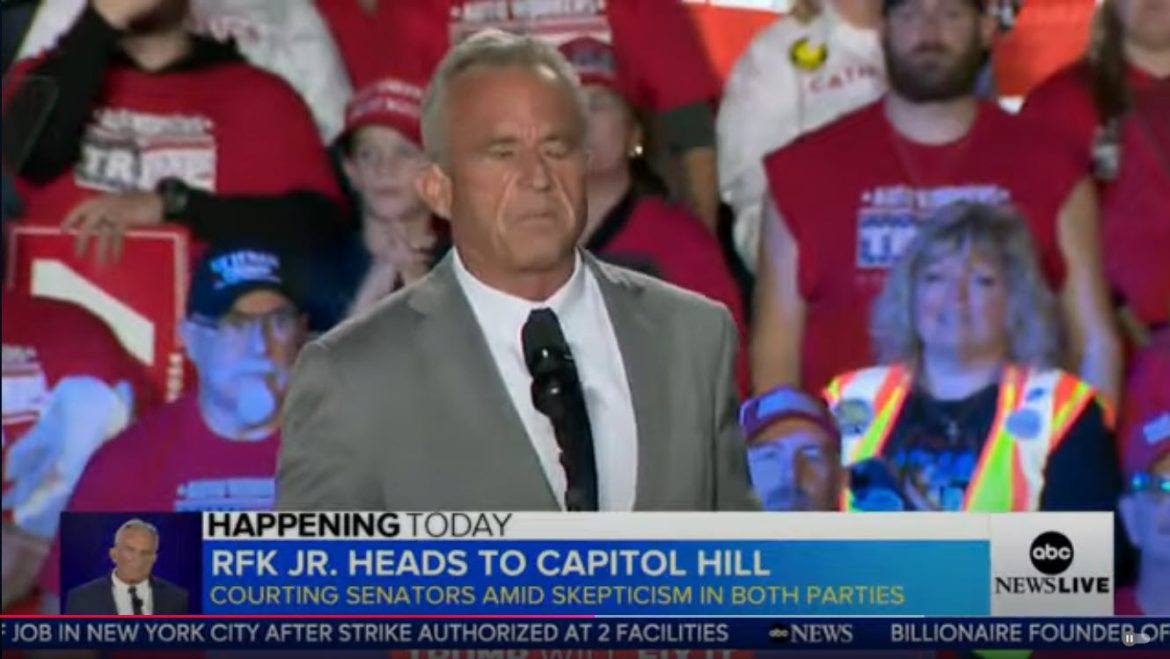Robert F. Kennedy Jr., President-elect Donald Trump’s nominee to lead the Department of Health and Human Services (HHS), is on Capitol Hill today seeking support for his confirmation. Kennedy, known for his controversial views on vaccines and public health policies, is engaging in back-to-back meetings with senators, aiming to secure the votes needed for approval.
Kennedy’s nomination has sparked intense debate, given his longstanding reputation as a vocal critic of certain vaccines and public health institutions. According to reports, he has more than two dozen meetings scheduled this week with senators from both parties, reflecting the uphill battle he faces in a divided Congress. While some Republican lawmakers praise his commitment to “health freedom” and his willingness to challenge established health agencies, others express reservations about his views on vaccine safety and scientific consensus.
The nomination comes amid fresh controversy following a New York Times report alleging that a longtime advisor to Kennedy attempted to pressure the Food and Drug Administration (FDA) into revoking approval for a polio vaccine. The report has drawn criticism from public health experts and lawmakers who argue that Kennedy’s leadership could undermine confidence in essential vaccination programs.
Despite the criticism, Kennedy appears determined to address senators’ concerns and present his vision for leading HHS. In a statement ahead of his Capitol Hill meetings, Kennedy emphasizes his commitment to reforming public health institutions, improving transparency, and addressing rising healthcare costs. “I am dedicated to restoring trust in our health agencies and ensuring every American has access to affordable, high-quality care,” he says.
Supporters of Kennedy’s nomination point to his environmental advocacy and his willingness to challenge pharmaceutical companies as strengths that could bring much-needed reform to HHS. Some also highlight his ability to connect with voters across ideological lines, a quality that resonates with Trump’s base and aligns with the administration’s broader agenda.
However, critics, including several Democrats and public health advocates, worry that Kennedy’s appointment could jeopardize ongoing vaccination campaigns and erode public trust in scientific expertise. His history of promoting vaccine skepticism, they argue, is particularly concerning in the wake of the COVID-19 pandemic and ongoing efforts to combat other infectious diseases.
As Kennedy’s confirmation process unfolds, senators on both sides of the aisle are weighing their priorities. Some moderate Republicans remain undecided, signaling that the final outcome could hinge on how effectively Kennedy addresses the controversies surrounding his nomination. Meanwhile, advocacy groups and public health organizations continue to voice strong opposition, urging lawmakers to consider the potential implications for the nation’s health infrastructure.
President-elect Trump, for his part, has stood firmly behind Kennedy, praising his “courage to speak the truth” and his commitment to challenging what Trump describes as the “deep state” within public health agencies. Trump’s endorsement signals that the administration sees Kennedy’s leadership as integral to its broader goals of deregulation and institutional reform.
As Kennedy navigates the confirmation process, the spotlight remains on Capitol Hill, where his meetings this week could determine the trajectory of his nomination. For now, the nation watches closely as senators deliberate on a decision with far-reaching implications for public health policy and governance.



